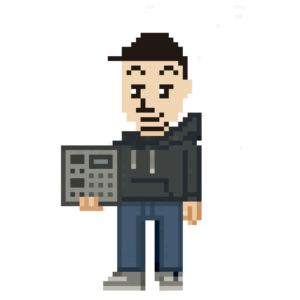Your cart is currently empty!
How to Choose Headphones for Beatmaking: The Ultimate Guide

Beatmaking is an art form that requires dedication, creativity, and most importantly, the right tools. One of the essential tools in any beatmaker’s arsenal is a good pair of headphones. A great set of headphones will enable you to hear every detail in your mix, helping you make better beats and ultimately improve your music production skills. But with so many options available in the market, how do you choose the right pair? In this comprehensive guide, we’ll discuss everything you need to know about selecting the perfect headphones for beatmaking.
Table of Contents
1. Understanding the Basics: Closed-back vs. Open-back Headphones
Before diving into specific models and features, it’s crucial to understand the fundamental difference between closed-back and open-back headphones. This distinction mainly relates to the design of the ear cups and will significantly impact your beatmaking experience.
a. Closed-back Headphones
As the name suggests, closed-back headphones have a sealed ear cup design, which effectively isolates your ears from outside noise. This design is beneficial for beatmaking, as it allows you to focus on your music without being distracted by external sounds. Additionally, closed-back headphones provide an immersive listening experience and prevent sound leakage, making them suitable for use in public spaces or shared environments.
b. Open-back Headphones
In contrast, open-back headphones have an open ear cup design, allowing air to pass through and sound to escape. While this design leads to a more natural and spacious soundstage, it also means that you’ll hear more ambient noise and that sound will leak out, potentially disturbing those around you. Open-back headphones are often preferred by audiophiles and mixing engineers who prioritize sound accuracy and a more expansive soundstage over noise isolation.
For beatmaking, closed-back headphones are generally recommended due to their superior noise isolation and immersive listening experience. However, if you work in a controlled environment and prioritize soundstage and accuracy, open-back headphones may also be an option.
2. Comfort and Fit: A Crucial Factor for Long Sessions
Beatmaking often involves long hours of work, and wearing uncomfortable headphones can become a significant hindrance. When choosing headphones for beatmaking, it’s essential to consider factors such as headband adjustment, ear cup padding, and overall weight. Look for headphones that have adjustable headbands and soft, cushioned ear cups to ensure a comfortable fit during extended periods of use.
3. Frequency Response: The Key to Accurate Sound Reproduction
Frequency response refers to the range of frequencies that headphones can reproduce, typically measured in Hertz (Hz). A wider frequency range means that the headphones can deliver more accurate sound reproduction, allowing you to hear every detail in your mix. For beatmaking, a frequency response of 20 Hz to 20,000 Hz is generally considered adequate, but headphones with an even broader range can provide added clarity and detail.
4. Impedance and Sensitivity: Understanding Power Requirements
Impedance, measured in ohms (Ω), refers to the electrical resistance that headphones present to the audio source. In general, higher impedance headphones require more power to deliver optimal performance, making them better suited for use with dedicated headphone amplifiers or professional audio interfaces. Lower impedance headphones, on the other hand, can be easily driven by portable devices like smartphones and laptops.
Sensitivity, measured in decibels (dB), indicates how efficiently headphones convert an electrical signal into sound. Higher sensitivity headphones produce more volume for a given input signal, while lower sensitivity headphones may require more power to reach the same volume level.
For beatmaking, it’s essential to consider the impedance and sensitivity of the headphones you choose, as these factors will determine their compatibility with your audio gear and overall performance.
5. Wired vs. Wireless: Balancing Convenience and Sound Quality
In recent years, wireless headphones have become increasingly popular due to their convenience and freedom of movement. However, when it comes to beatmaking, wired headphones are typically preferred for their superior sound quality and minimal latency. Wireless headphones often introduce latency, which can be problematic when working on precise audio tasks like beatmaking, as it can cause a slight delay between the audio source and what you hear.
Moreover, wired headphones usually provide better audio quality, as they don’t rely on Bluetooth or other wireless codecs, which can sometimes lead to audio compression and signal loss. If you still prefer the convenience of wireless headphones, consider looking for models with aptX or LDAC support, which offer higher-quality audio transmission over Bluetooth.
6. Durability and Build Quality: Investing in Longevity
High-quality headphones can be a significant investment, and it’s crucial to choose a durable and well-built pair that will stand the test of time. Look for headphones with robust construction, high-quality materials, and replaceable parts, such as ear pads and cables. Investing in a durable pair of headphones will save you money in the long run, as you won’t have to replace them as frequently.
7. Price Range: Finding the Right Balance
Headphones for beatmaking come in various price ranges, from budget-friendly options to high-end models. While it’s tempting to purchase the most expensive pair available, it’s essential to find the right balance between cost and quality. Set a budget for yourself and look for headphones that offer the best value in terms of comfort, sound quality, and durability within that price range.
8. Top Headphone Recommendations for Beatmaking
To help you find the perfect pair of headphones for beatmaking, here are some top recommendations in various price ranges:
a. Budget-friendly Options:
- Audio-Technica ATH-M40x
- Sennheiser HD 280 Pro
- Beyerdynamic DT 240 Pro
b. Mid-range Options:
- Sony MDR-7506
- Beyerdynamic DT 770 Pro
- Sennheiser HD 600 (open-back)
c. High-end Options:
- Audeze LCD-X (open-back)
- Focal Clear Professional (open-back)
- Neumann NDH 20
Conclusion
Choosing the right headphones for beatmaking can be a daunting task, but keeping the factors discussed in this guide in mind will make the process much more manageable. By considering the headphone design, comfort, frequency response, impedance, sensitivity, wired or wireless options, durability, and price range, you’ll be well-equipped to find the perfect pair to elevate your beatmaking skills. With the right headphones, you’ll be able to hear every detail in your mix, allowing you to create better beats and improve your overall music production capabilities.
About The Author

Born in 1982 in Japan, he is a Japanese beatmaker and music producer who produces experimental hiphop beats. He is the owner of Genx Records. Because he grew up internationally, he understands English. His hobbies are muscle training, artwork creation, website customization, and web3. He also loves Korea.
Website: genxrecords.xyz
Share This Post:
Leave a Reply